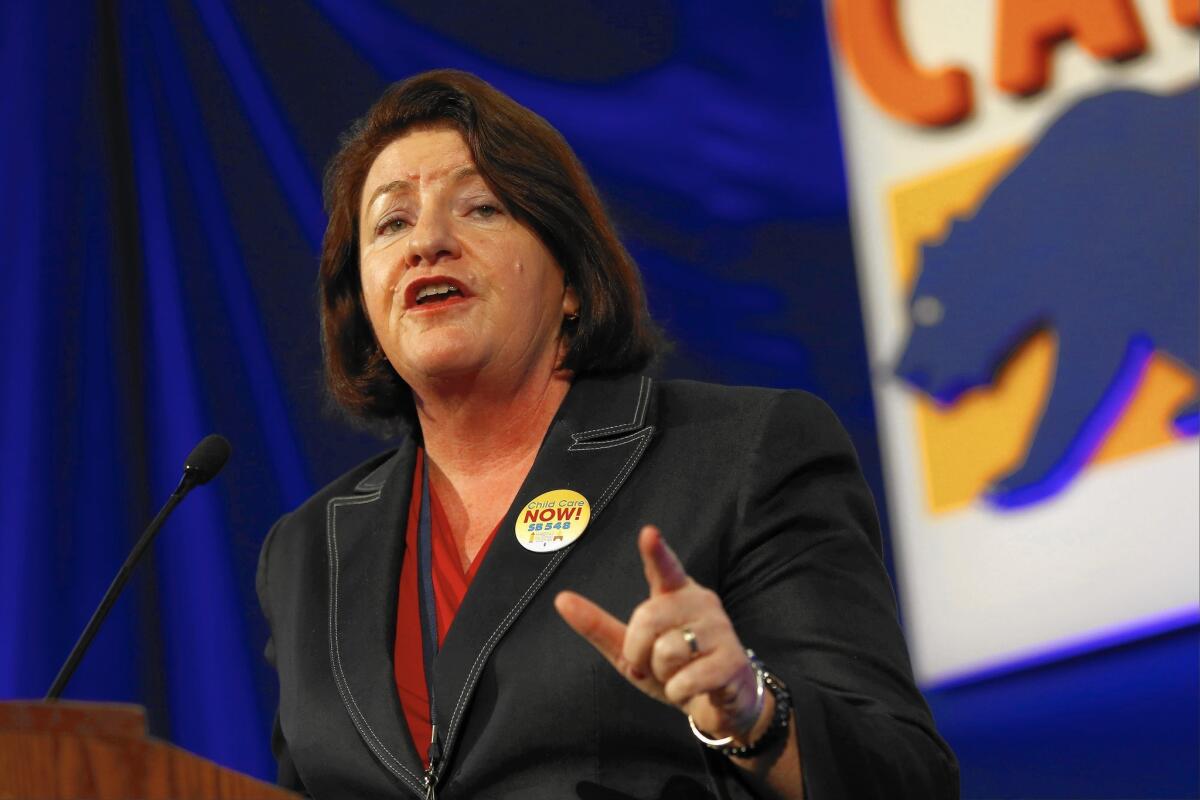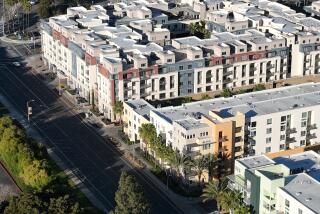Column: Legislator says she has an answer to state’s housing crunch

Assembly Speaker Toni G. Atkins (D-San Diego) draws on her personal experience in the need for affordable housing.
Reporting From San Diego — You can’t pass an apartment building or drive through a neighborhood here without hearing a story from Toni Atkins about what she calls the “foundation for every piece of our lives.”
The places we call home.
“This here is called Ten Fifty B,” the Democratic speaker of the California Assembly said as we pulled over to take in a 220-unit downtown high-rise.
I thought it looked like a sleek condo project for professionals and urban hipsters, and initially, that’s what it was going to be. But the deal fell apart and the building was reconstituted as an apartment house for low-income families, some of whom are able to walk to jobs at hotels and restaurants.
“Why shouldn’t they be able to live right here?” Atkins asked, and avoid a long commute that makes traffic all the worse for everyone?
The problem is that when a building like that opens its doors, as this one did five years ago, there’s nowhere near enough room at the inn to handle the clamor.
“You can have up to 10 times as many applicants as you have slots,” said Jennifer LeSar, an affordable-housing developer who is Atkins’ spouse.
But it’s not just low-income families that are locked out of adequate housing in California, where rental rates and home prices continue to rise even as income remains flat or even dip for millions of working folks.
“When you make $100,000 in combined salary,” said Atkins, “and you’re struggling because of the cost of housing — rather than because you don’t budget well or spend wisely — there’s something wrong with that.”
Atkins said some Californians are spending as much as two-thirds of their income on housing. That’s not just a great hardship, but also a blow to the economy because they have so little spending money left over. The problem is made worse because the flow of federal funds for affordable housing is barely a trickle, redevelopment agencies were shut down and state bonds don’t last forever.
So projects like Ten Fifty B, and other big developments Atkins showed me in the Logan Heights and City Heights neighborhoods, are needed more than ever but harder and harder to build.
I’ve seen the impact in Los Angeles the last few months. I’ve visited a family living in a converted garage, a senior citizen living in a van and a woman whose home is a storage shed. I’ve seen five adults stuffed into a studio apartment, a couple who fell out of the middle class and into a room in a relative’s house, and a supermarket employee who lives in a dumpster-size room in a boarding house where nine people share a single bathroom.
No public official in California has been as committed to doing something about these realities as Atkins, who has introduced or supported several bills now pending in the Legislature. So last week, I took the train to San Diego, where Atkins used to serve on the City Council, to learn more about how and why housing became an obsession for her.
The answer begins with a trip back to her childhood in rural Virginia. Atkins lived with her siblings and working-poor parents — a miner and a seamstress — in a home that was missing a couple of modern conveniences.
“It was a four-room house with no bathroom, and you carried water from a spring,” she said. She figured that was the way everyone lived.
Later, while in college, she worked for a Legal Aid attorney who sent her out to collect the stories of clients who needed help — clients to whom she could relate. One story, about a retired school teacher in her 80s, stood out.
“She lived in a run-down trailer… and it looked worse than the house I had lived in,” said Atkins, who recalls big cockroaches — which generally hide out until dark — skittering about by day.
In San Diego, she worked as a City Council aide in the 1990s and did the same kind of research, visiting homes where she saw lead paint, infestations, leaky pipes, mold and other problems, along with all the health problems and stress those conditions foster. People couldn’t afford improvements and couldn’t afford to move.
“I think I have a responsibility, and I think government has a role ... to provide some structure when things are out of balance,” Atkins said.
To that end, she’s been lobbying for her legislation, and the most important piece is Assembly Bill 1335. The bill would impose a $75 recording fee on deeds and other documents that must be filed when, for instance, you refinance your property. The total fee would be capped at $225 for multiple documents, and this would generate $300 million to $500 million annually.
That dedicated source of funding would be made available throughout the state — much of it controlled by local communities — to construct and rehabilitate thousands of housing units that would sell below market rate. The bill would create an estimated 20,000 to 30,000 construction-related jobs, which explains why building councils throughout the state are in favor. Money from AB 1335 could also be used to assist low-income residents with down payments on home purchases.
“It’s not the total answer, it’s just one answer,” said Atkins, who added that one of the biggest backers is Los Angeles Mayor Eric Garcetti.
The mayor told me he will be part of a contingent that lobbies Gov. Jerry Brown on the bill later this month. Garcetti said that if Los Angeles got, say, $20 million annually from AB 1335, it could be used to leverage up to five times that amount from public, private and nonprofit sources.
“It’s a big number,” said Garcetti, who envisions refurbishing existing buildings, constructing new rentals, adding housing stock for veterans and creating more supportive housing for those with mental health problems.
But the bill — which has support from Democratic legislators and the California Assn. of Realtors — will require two-thirds approval in Sacramento, meaning that Atkins has to win the support of at least a couple of Republicans.
That won’t be easy, and she knows she’s up against those who begin hyperventilating at the hint of any new tax or government program, as well as those who object to singling out the document-recording industry as a source of revenue.
But California’s resurgent economy isn’t working for everyone, said Atkins, who gave a $5 bill to a homeless guy while we were stopped at an intersection. That’s not going to solve his problems, Atkins said, but she recalled the time her mother broke her arm and couldn’t work, and a neighbor gave her $5 that made all the difference for at least one night.
“I just don’t feel like we can leave people behind,” she said.
Twitter: @LATstevelopez
More to Read
Sign up for Essential California
The most important California stories and recommendations in your inbox every morning.
You may occasionally receive promotional content from the Los Angeles Times.











